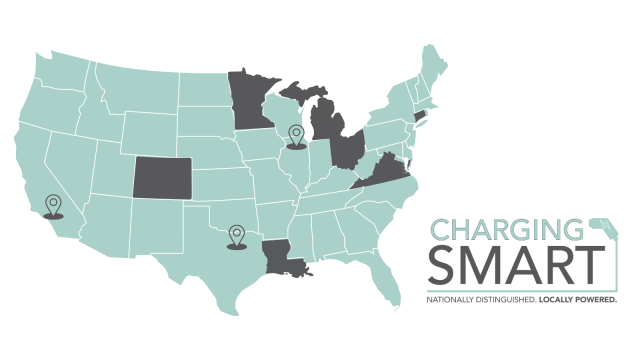RMI, IREC Show How Municipalities Can Help Deploy Up to 3 Million Non-Home EV Chargers by 2030
Washington, D.C. (Aug. 31, 2023) — RMI, the Interstate Renewable Energy Council (IREC), and the Sustainable Energy Action Committee (SEAC) have published a document designed to guide municipalities on approval processes for siting and installing electric vehicle (EV) charging infrastructure. This guidance was developed through a year-long process guided by RMI and IREC that engaged municipalities, charging providers such as electric vehicle service providers, as well as planning consultants, researchers, and recognized experts.
The document, titled “Planning and Zoning Guidance for Electric Vehicle Charger Deployment” comes at an auspicious time, as EV adoption continues to increase. EV sales accounted for a record 8.4 percent of all new U.S. vehicle sales in the first quarter of 2023—a nearly 75 percent increase from 2022. Leading automakers such as General Motors, Ford, BMW, Mercedes Benz, and Volvo have announced extraordinary levels of spending aimed at electrifying half or more of their annual sales by 2030-2035, with some committed to going completely electric. And in the first quarter of 2022, EV sales in the U.S. rose by 60 percent even as overall new car sales dropped 18 percent.
According to the National Renewable Energy Laboratory, 28 million charging ports, including at least 182,000 publicly accessible fast charging ports, will be needed by 2030 to support a mid-point EV adoption scenario (approximately 33 million EVs). The publicly accessible charging demand for 2030 is nearly 10 times today’s 132,000 charging ports.
“Equitable deployment of EV charging stations is a critical need for communities throughout the U.S., impacting mobility, air quality, and much more. Transparent and predictable requirements for EV charger installation will make it simpler and less expensive for municipalities and service providers to manage much needed growth,” said IREC President and Chief Executive Officer Larry Sherwood.
The RMI/IREC guidance includes details about a proposal to add EV charger readiness to the 2024 International Energy Conservation Code and features examples of comprehensive planning documents, such as Phoenix’s 2022 Zero-Emission Vehicle Roadmap and Chicago’s 2022 Climate Action Plan. It also includes existing legislation and codes on zoning and permitted accessory use, parking counts and mandates, accessibility, design, aesthetics, equipment location, and more.
“Today, the planning and zoning approval processes used for siting and installing EV chargers are overly complex, opaque, and difficult to navigate, resulting in unnecessary delays and high costs,” said E.J. Klock-McCook, a principal on RMI’s Carbon-Free Transportation team. “By providing streamlined, transparent, and predictable processes, municipalities can save money and hasten EV charging infrastructure improvements, while also making progress towards their climate goals.”
Download the guidance document
About RMI
RMI is an independent nonprofit founded in 1982 that transforms global energy systems through market-driven solutions to align with a 1.5°C future and secure a clean, prosperous, zero-carbon future for all. We work in the world’s most critical geographies and engage businesses, policymakers, communities, and NGOs to identify and scale energy system interventions that will cut greenhouse gas emissions at least 50 percent by 2030. RMI has offices in Basalt and Boulder, Colorado; New York City; Oakland, California; Washington, D.C.; and Beijing. Visit the RMI website here.
About IREC
The Interstate Renewable Energy Council (IREC) builds the foundation for rapid adoption of clean energy and energy efficiency to benefit people, the economy, and our planet. Its vision is a 100% clean energy future that is reliable, resilient, and equitable. IREC develops and advances the regulatory reforms, technical standards, and workforce solutions needed to enable the streamlined integration of clean, distributed energy resources. IREC has been trusted for its independent clean energy expertise for over 40 years, since its founding in 1982. For more information, visit www.irecusa.org or follow IREC on Twitter, LinkedIn, or Facebook.
About the Sustainable Energy Action Committee
The Sustainable Energy Action Committee facilitates the efficient use of clean, sustainable energy through collaborative development and distribution of codes, standards, and best practices. SEAC membership is open to all, including AHJs, engineers, first responders, suppliers, utilities, and test labs. Join our monthly general meetings, attend one of our 11 working groups, or visit sustainableenergyaction.org to learn more.
Media Contact: E.J. Klock-McCook, Principal, RMI, [email protected]



